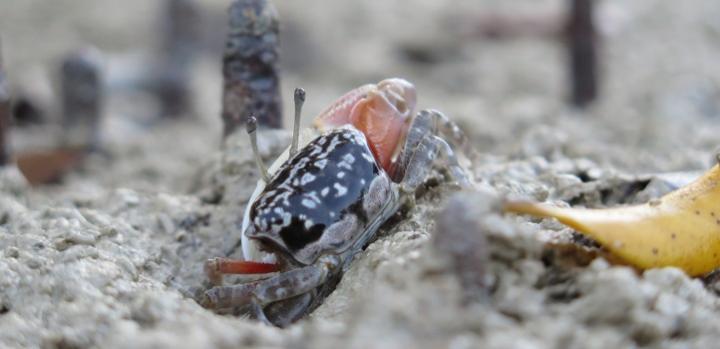
Credit: © 2019 Marco Fusi
The types of bacteria present in and around mangrove fiddler crab burrows in three different geographic locations were compared by KAUST researchers. They found that the crabs’ burrowing activity changed the sediment in a way that attracted different types of bacteria across the three locations: however, the bacteria performed similar functions, such as aerobic respiration, and potential ecological services, such as turnover of organic matter.
“Mangrove crabs act like ecosystem engineers: Their burrows create radial, halo-like microbiological and geochemical modifications to the surrounding sediment compared with soil that has been left undisturbed,” says Jenny Booth, the first author of the study. “This effect was similar in all three locations, with the burrow-dwelling bacteria being taxonomically different but functionally similar,” she adds.
Microorganisms play important roles in driving global biochemical cycles, such as the nitrogen cycle, in which nitrogen–a building block of proteins and nucleic acids– circulates among the earth, the atmosphere and marine ecosystems.
Microbial ecologist Daniele Daffonchio and his team at KAUST’s Red Sea Research Center hypothesized that bacteria present within the same model system had similar functions, rather than similar taxonomy, even when these systems existed in very different local environmental conditions.
To test this, they sampled the sediment in and around the burrows created by mangrove-dwelling fiddler crabs in two locations on the Saudi Red Sea and a third in South Africa.
The researchers say their findings could be explained by the fact that burrowing leads to similar changes in the sediment regardless of location. Crabs typically bring sediment up from deeper layers onto the surface and vice versa. This sediment mixing changes the biochemical composition of the surrounding sediment, creating a hotspot of oxidative reactions and changing the types of bacteria living there. Burrow sediment, for example, has more bacteria that use oxygen for respiration, while the surrounding bulk soils have more bacteria that employ anaerobic respiration mechanisms. Sediment mixing also increases nutrient availability, and thus bacterial activity, within the burrow soils.
The researchers estimate that the halo-like ring of biochemical and microbial changes that extend a small distance around the fiddler crab burrows can influence up to 35 percent of mangrove sediment. In Kenyan mangroves, where burrow density is very high, this effect can influence almost 80 percent of the sediment.
“We predict that the bioturbation effect of crabs and similar burrowing species has a large overall impact on mangrove ecosystems by altering the nature of the sediment’s microbiome. These changes ultimately govern environmental processes, like carbon and nutrient fluxes, in this coastal ecosystem,” says Daffonchio.
###
Media Contact
Carmen Denman
[email protected]
Original Source
https:/
Related Journal Article
http://dx.




